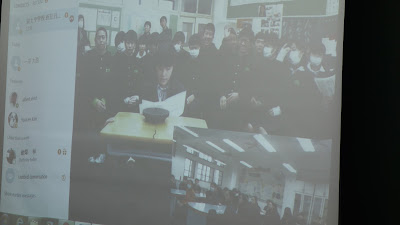Two of my colleges came aboard and generously rearranged their schedules quite a few times to finally make this happen. To my surprise, their students absolutely loved it and some even felt sorry they didn't get to do the presentation because of time constraints. It was worth all the time and effort, especially when reading their genuine positive feedback in the communication books.
The Big Difference and Pleasant Surprise
What made these three Skype sessions so special from what I've done before? Well, over 100 students were involved, and most of the English teachers came to observe. Other than my own homeroom and club students, a lot more participants from the other two classes also took part in this project. Those students managed to finish the self-introduction worksheets, create their PPT slides, and even rehearsed a bit in such short period of time after the midterm.
My Japanese counterpart's students were energetic and lively. They constantly smiled and waved their hands during the sessions. They clapped their hands after every presentation to encourage each other. Also, they made posters with scripts and cute pictures about what they said, including self-introduction and what is the most important to them. They said thank you and goodbye in Chinese before we called it a day.
How to Learn English
To wrap up the class, I spent another 10 minutes or so to reiterate the importance of using English. With the help of technology and an authentic environment like this, they should come to realize that learning English isn't all about tests and scores. Instead, it IS an effective tool to make friends and know the world better. Also, rote memorization of vocabulary and grammar, of course, is boring, but if you try to think of a real-life situation and ask yourselves how you would apply what you learned in textbooks, this perspective would definitely help you learn in a whole new way. Finally, English is a foreign language for both countries. Taiwanese students, as well as Japanese ones, carry an accent when speaking English. However, you would also feel less intimated to make mistakes because nobody speaks perfect English on both sides.
The Audio Issue
It would be really frustrating if the audio quality is poor enough to hinder comprehension and communication. We've experienced breaking-up voices and muffled sounds coming from the classroom speakers. There are many possible variables that can cause the trouble, including the Internet connection, the hardware, and another interfering application. Even though we ran a test on Skype, it still happened from time to time.
The Feedback
As usual, many of my students left positive feedback in their little diary the next day. On top of that, both of my colleges told me that they really would like more opportunities like this in the future, so we discussed the possibility of inviting the AIESEC volunteer to come over and share Japanese school life again. After the first session, one colleague asked me whether I could come to her class and share this project with her students.
Break a Leg
A group of
Japanese professors are coming to my school next Tue. and observe our fourth
Skype sessions in the classroom. The assigned topics are self-introduction,
Taiwanese scouting and camping activities, and the beauty of Taichung. The
members of the International Cultural Exchange Club and both my gifted students
are going to participate. I'm going to be multitasking throughout the entire
reception and class observation. Wish me luck.







No comments:
Post a Comment